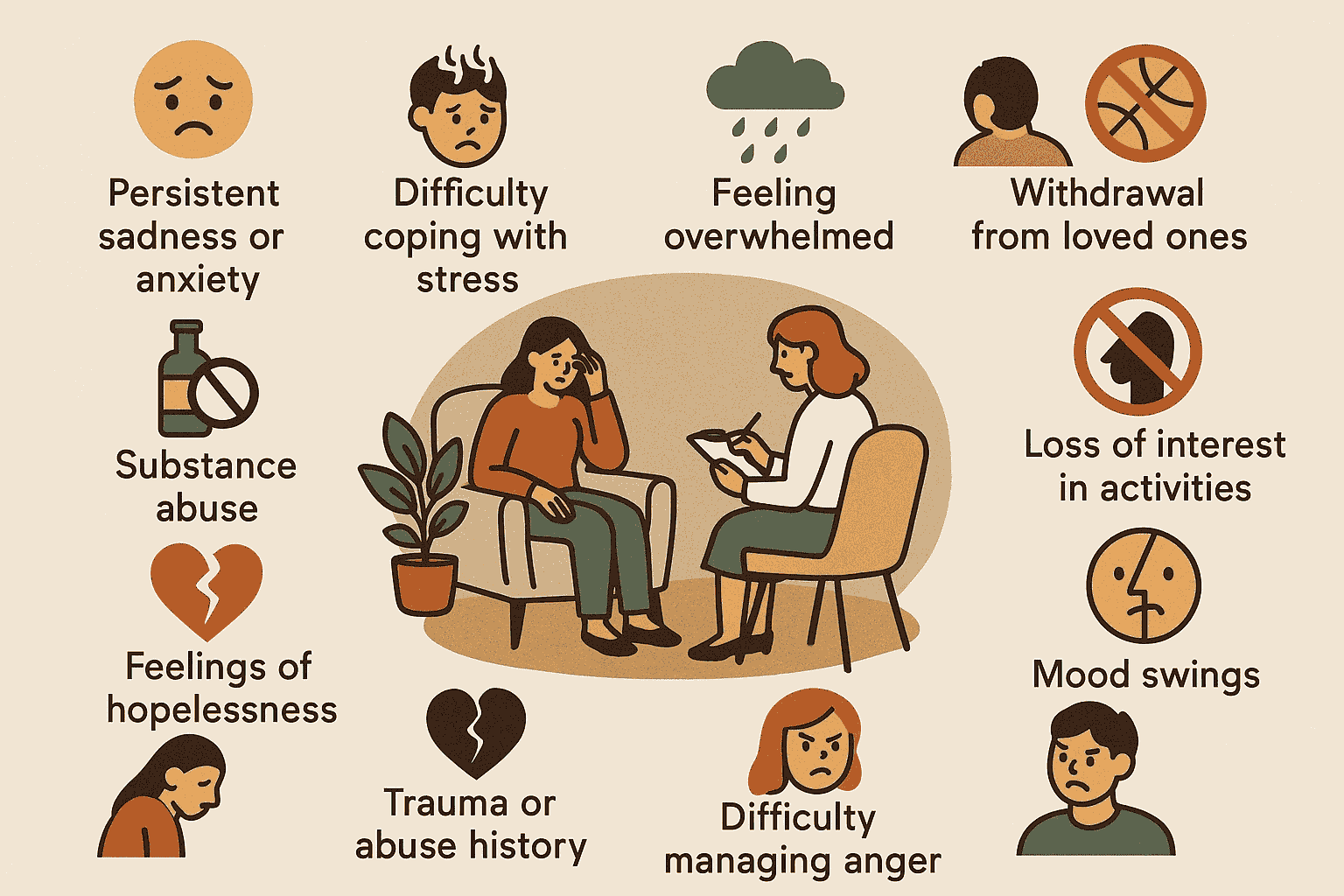Expert advice on getting started with Individual Teen Counselling
Wiki Article
Trick Insights Into Mental Therapy for Teenage Minds: Supporting Psychological Knowledge
Mental treatment for young adults presents distinct challenges and opportunities. Adolescents experience substantial emotional complexity as their brains create. Nurturing psychological knowledge becomes crucial in this scenario. Restorative approaches like Cognitive Behavior Therapy and Dialectical Behavior Treatment deal useful devices. These approaches not only foster self-awareness however also boost compassion. Comprehending just how these techniques effect individual growth can disclose essential insights into the mental well-being of young minds. What exists at the junction of therapy and psychological advancement?Understanding the Teenage Brain: Development and Emotional Intricacy
The teenage brain is a dynamic landscape, identified by substantial developmental adjustments that shape psychological reactions and actions. During teenage years, the prefrontal cortex, in charge of decision-making and impulse control, undergoes essential growth. Simultaneously, the limbic system, which regulates feelings, ends up being a lot more active, leading to increased emotional experiences. This discrepancy can result in extreme mood swings and impulsive actions, as the psychological center frequently eclipses rational thought.Natural chemicals like dopamine play a crucial duty in this stage, influencing pleasure and reward-seeking habits. As young adults navigate social interactions and identity development, their brains are wired to prioritize peer acceptance and emotional experiences. This period of fast growth is very important for establishing durability and versatility, although it can additionally cause obstacles in mental health. Understanding these adjustments is crucial for moms and dads, instructors, and psychological health and wellness professionals as they seek to sustain teenagers with this complicated developing phase.
The Relevance of Emotional Knowledge in Adolescents
Identifying the significance of psychological intelligence throughout teenage years is necessary, as it lays the structure for efficient communication, compassion, and self-regulation. Adolescents are steering a complicated developmental stage characterized by rising and fall feelings and social dynamics. Individual Teen Counselling. Psychological intelligence equips them with the capacity to comprehend and handle their sensations while also reacting and identifying to the emotions of others. This skillset cultivates healthier connections, decreases dispute, and improves collaboration amongst peers
Furthermore, emotional intelligence supports academic success by advertising strength and flexibility in the face of difficulties. As young adults discover to cope with tension and troubles, they develop a more powerful sense of self-regard and identity. Growing emotional intelligence throughout these formative years can bring about lasting advantages, consisting of improved psychological health and wellness and wellness. Ultimately, focusing on psychological knowledge in adolescents is vital for their general development and future social effectiveness.
Efficient Therapeutic Methods for Young Adults
While numerous healing techniques exist, selecting the most effective techniques for young adults calls for an understanding of their distinct developmental demands. Cognitive Behavioral Treatment (CBT) is often preferred for its organized approach, helping adolescents identify and modify negative thought patterns. Dialectical Behavior Modification (DBT) is another efficient method, particularly for those dealing with emotional regulation, as it incorporates individual treatment with abilities training in mindfulness and interpersonal effectiveness.Additionally, art and play therapies give imaginative outlets for self-expression, making therapy much more accessible for those who may find spoken interaction challenging. Individual Therapy For Teens. Group treatment setups can likewise promote peer links, permitting young adults to share experiences in a helpful environment. Ultimately, including family therapy can improve interaction and understanding within the family members device, dealing with characteristics that may add to the teenager's emotional struggles. Eventually, the effectiveness of these methods exists in their flexibility to specific circumstances and requirements
Structure Resilience Via Psychological Treatment
Structure resilience through mental treatment is essential for young adults encountering different life challenges, as it furnishes them with coping methods and psychological tools needed to guide with hardship. Mental treatment provides an organized atmosphere where adolescents can discover their ideas and sensations, facilitating a deeper understanding of themselves. Strategies such as cognitive-behavioral therapy (CBT) urge teenagers to recognize negative idea patterns and change them with useful ones, fostering a resistant way of thinking. Additionally, mindfulness techniques incorporated right into therapy can help young adults stay grounded throughout stressful scenarios, enhancing their capacity to cope. The abilities learned through mental treatment empower teenagers to approach challenges with confidence, enabling them to recuperate from obstacles. As they create strength, they end up being more experienced at handling future difficulties, ultimately adding to their emotional health and personal development. This structure of durability is crucial for steering the complexities of adolescence and getting ready for the adult years.Encouraging Open Interaction and Supportive Relationships
Just how can open up interaction and encouraging relationships boost a teenager's psychological wellness? Individual Therapy For Teens Developing a society of open discussion promotes count on and emotional safety, allowing young adults to reveal their ideas and feelings without concern of judgment (Individual Therapy For Teens). This assistance aids them navigate the complexities of teenage years, promoting resilience versus anxiety and stress and anxietyEncouraging relationships, whether with parents, peers, or coaches, play a vital role in a young adult's advancement. They offer a network of motivation and understanding, which is important during challenging times. When teenagers feel listened to and valued, they are more likely to create healthy coping systems and psychological intelligence.
Motivating open communication also empowers teens to articulate their demands and look for assistance when essential. This aggressive method can greatly minimize feelings of isolation and misery. On the whole, nurturing these links outfits young adults with basic devices for psychological law and individual development, ultimately enhancing their mental health.
Frequently Asked Inquiries
How Can Parents Recognize When Their Teenager Needs Therapy?
Parents can recognize their teen's demand for therapy by observing significant changes in actions, mood fluctuations, withdrawal from social activities, decreasing academic efficiency, increased irritation, and expressions of sadness or stress and anxiety that linger over time.What Function Does Social Network Play in Adolescent Mental Health And Wellness?
Social media substantially influences teen psychological wellness by forming self-worth, cultivating links, and revealing individuals to cyberbullying. Its impact can be both unfavorable and favorable, depending upon use patterns and the nature of on the internet interactions.Are There Specific Therapies Much Better Matched for Young Boys or Women?

Exactly How Can Schools Assistance Mental Health Initiatives for Pupils?
Institutions can sustain psychological wellness initiatives by implementing therapy services, promoting social-emotional understanding programs, providing mental health and wellness sources, promoting an encouraging atmosphere, and supplying workshops that educate trainees on coping strategies and psychological strength.
What Are Common Mistaken Beliefs Concerning Teen Treatment?
Typical false impressions concerning teenage treatment include the belief that it is only for serious concerns, that it shows weakness, or that teenagers lack the ability to engage. These misconceptions can impede access to necessary psychological health support.Psychological therapy for teenagers provides special challenges and chances. Therapeutic approaches like Cognitive Behavior Treatment and Dialectical Actions Therapy deal beneficial devices. In addition, art and play treatments give creative electrical outlets for self-expression, making treatment more available for those that may locate verbal communication challenging. Including family members treatment can enhance interaction and understanding within the household system, attending to dynamics that might add to the young adult's psychological battles. Structure resilience through psychological therapy is crucial for teenagers encountering different life difficulties, as it equips them with coping approaches and psychological devices required to guide via misfortune.
Report this wiki page